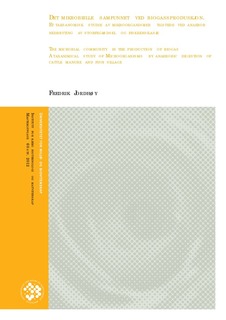Det mikrobiologiske samfunnet ved biogassproduksjon. Et taksonomisk studie av mikroorganismer tilstede ved anaerob nedbryting av storfegjødsel og fiskeensilasje
Master thesis
Permanent lenke
http://hdl.handle.net/11250/186434Utgivelsesdato
2012-09-11Metadata
Vis full innførselSamlinger
- Master's theses (KBM) [890]
Sammendrag
Sammendrag:
Dette studiet har fokusert på det mikrobielle samfunnet i en biogassreaktor. Mikroorganismer som bakterier og archaea deltar i produksjon av biogass gjennom en prosess kalt anaerob nedbryting (anaerobic digestion). Det mikrobielle samfunnet i en biogassreaktor er svært komplekst. I den senere tid er det imidlertid tatt i bruk molekylære metoder som «high-throughput» sekvensering, noe som har gitt oss en bedre innsikt i dette. Med denne metoden kan en analysere store mengder data på forholdsvis kort tid og til en overkommelig pris. En ulempe kan være forholdsvis korte avlesninger på 100 bp, men Illumina MiSeq har endret dette med avlesning på 150 bp. Ved bruk av metoder som FISH, qPCR og sekvensering, var hensikten med oppgaven å påvise grupper av mikroorganismer, deres rolle i biogassprosessen, utvikling i oppstartsperioden for biogassreaktorer med substrat fra storfegjødsel og fiskeensilasje, samt forekomst av spesifikke grupper av metanogener i forhold til total forekomst av archaea. Våre forsøk viste størst dominans for bakterier som tilhørte fyliet Firmicutes, mens Methanobacteriales viste størst dominans blant metanogener. I tillegg til de oppnådde resultater, har oppgaven vist at det har vært gunstig å kombinere ulike metoder for analyse av det mikrobielle samfunnet. Dette kan være et grunnlag for videre arbeid i lignende forsøk.
Abstract:
This study has focused on the microbial community in a biogas reactor. Microorganisms in the form of bacteria and Archaea are involved in the production of biogas through a process called anaerobic digestion. The microbial community in a biogas reactor is very complex. Recently it has been adopted molecular methods to gain a greater insight. New methods such as "high-throughput" sequencing have made it possible to gain a greater insight into the microbial community. This method can analyze large amounts of data in a relatively short time and at an affordable price. A disadvantage may be relatively short reads of 100 kb, but Illumina MiSeq has temporarily changed this with a reading of 150 kb. The purpose using methods such as FISH, qPCR and sequencing is to identify groups of microorganisms, their role in the biogas process, development of start-up period for biogas reactors with substrate from cattle manure and fish silage, and the occurrence of specific groups of metanogenes in relation to the total incidence of Archaea. The result showed the greatest dominance of bacteria belonging to Firmicutes phylum, while Methanobacteriales demonstrated the greatest dominance among methanogens. In addition to the results obtained, the task has shown that it has been beneficial to combine various methods of analysis of the microbial society. This might be a basis for further work on these methods in related experiments.
